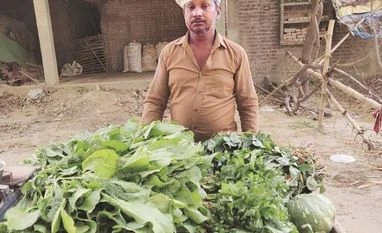His cart overflowing with luscious green spinach and coriander, Dileep Kumar Sonkar is talking to Business Standard quite cordially when he sees something, yells, leaves his cart in the middle of the narrow dusty village track, and runs, waving his arms frantically. A herd of cows has entered his field and is chomping away at tender green carrot tops, trampling over the carefully laid furrows that ensure optimal water flow. After he has dislodged the intruders with hefty thwacks from one of the many bamboo sticks, apparently stuck in the ground with that very strategic purpose, and returns panting to the conversation, he says, “You feel like crying when that happens.”
All over UP, people have their own stories to tell about the cow protection campaign launched by Chief Minister Yogi Adityanath, that enables farmers with ageing cows that no longer give any milk, to just herd them out into the fields — never their own. The problem is especially acute in places such as Jaunpur, on the banks of the Gomti river that produces the plumpest, purplest brinjals (called ‘bhanta’ in these parts), the sweetest tender green peas, and in the winter, radish as thick as a man’s thigh, sometimes weighing as much as 10 kg apiece, with not a hint of fibre. Jaunpur ki mooli is the stuff of legend. With virtually no industry in the region, vegetables and wheat is the primary occupation of this rich alluvial soil. Currently, Yogi Adityanath is people’s pet hate.
Pankaj Pandey is a local boy, who studied pharmacy and got a lucky break. He is Jaunpur’s export to Sikkim, where he has a job in a chemical plant. He’s back home on leave — it is harvest season and his family has around 5 bighas that they let out to lower caste families like Sonkar’s. Pandey is the landlord; Sonkar, the tenant.
The political dynamics between the two is interesting. Pandey, absentee landlord and migrant, says there’s a wave in favour of Narendra Modi sweeping the region. “He’s done a lot: opened bank accounts for people. Now you can pay all your bills online. You have access to capital via the Mudra Yojana. We now have cooking gas and no longer have to go out hunting for firewood.”
Although primarily agrarian, his family has a non-agricultural source of income: his salary. If they did not have that… his grandmother (who avoids smiling for the camera because she has no teeth and has to be gently chivvied to do so) says, “These cows! You pour everything you have into water, manure and power… and all for the cows. There’s no money in agriculture any more. You earn barely enough to keep body and soul together.”
Sonkar glances slyly at Pandey when asked what the biggest problems the region has. “When one group becomes powerful, there will be conflict,” he says.
With just about 10 per cent of Muslims in the region, the conflict in Jaunpur is caste-based: between the upper and lower castes. “Hindus should do the work Hindus are supposed to; Muslims should do the work they are supposed to,” he says, refusing to elaborate. The subtext is clear. In the past, old cows would be sold quietly to abattoirs. Now, the abattoirs are either shut, or are monitored closely. “Modiji talks in the interest of the country. But this Yogi: he has sounded the death knell for farmers,” Sonkar says.
The Opposition and the BJP are well-matched, though this is another seat where the Congress has set up a candidate. The BJP’s sitting MP, Krishna Pratap (KP) Singh, has been renominated. Against him is the youthful Congress candidate, Debvrat Mishra, the son of legendary MP, Baba Mishra. But the Congress has never won this seat after the 1984 election. Actor and singer Ravi Kishan had contested this seat as a Congress candidate in 2014 but was relegated to the sixth place: he got even fewer votes than the Aam Aadmi Party candidate.
The seat has gone to the Bahujan Samaj Party (BSP) under the SP-BSP alliance, which has fielded Shyam Singh Yadav.
C-Voter, a well-known election survey agency, says 47 of 80 seats in Uttar Pradesh could cause the BJP’s downfall in the state. In these 47 constituencies, the Muslim-Yadav-Dalit (MYD) population is more than 50 per cent. Jaunpur is one of those seats. In 2014, K P Singh’s margin of victory was around 140,000. But the SP and the BSP both put up candidates. This time, it is the Congress candidate who will pare the BJP’s votes. And the middle castes and the Dalits will largely vote against it. This means that at the very least, KP Singh’s margin of victory will go down: and at worst, there is a chance the BJP might lose the seat.
Perhaps apprehending this, BJP President Amit Shah and UP Deputy Chief Minister, Keshav Chandra Maurya, are holding public meetings in Jaunpur. Maybe they can hear the warning bells ring.
None of the ecstasy of the reception the BJP and Modi got in Varanasi, barely two hours away, is visible in Jaunpur. Those in favour of Modi are vocal. But it is the silent ones, like Dileep Sonkar, who will decide the fate of those in the fray.
Unlock 30+ premium stories daily hand-picked by our editors, across devices on browser and app.
Pick your 5 favourite companies, get a daily email with all news updates on them.
Full access to our intuitive epaper - clip, save, share articles from any device; newspaper archives from 2006.
Preferential invites to Business Standard events.
Curated newsletters on markets, personal finance, policy & politics, start-ups, technology, and more.
)